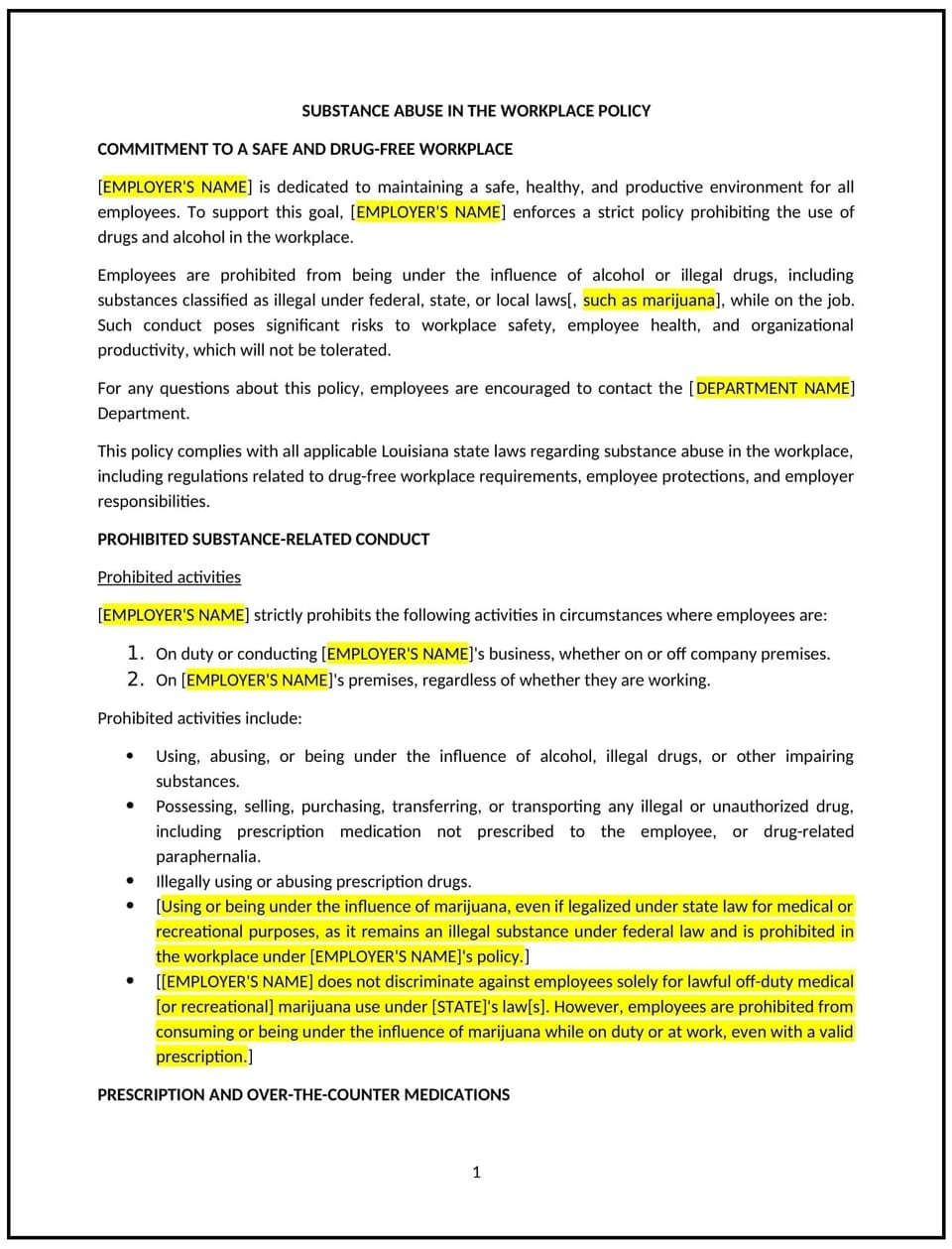Substance abuse in the workplace policy (Louisiana): Free template

Substance abuse in the workplace policy (Louisiana)
This substance abuse in the workplace policy is designed to help Louisiana businesses maintain a safe, productive, and healthy work environment by addressing the use of drugs and alcohol in the workplace. It outlines expectations, responsibilities, and procedures for preventing and managing substance abuse issues.
By implementing this policy, businesses can reduce risks, promote safety, and support employees who may need assistance.
How to use this substance abuse in the workplace policy (Louisiana)
- Define prohibited substances: Specify which substances are prohibited, including illegal drugs, alcohol, and unauthorized prescription medications.
- Outline workplace expectations: Clarify that employees must be free from the influence of substances while performing job duties or on company premises.
- Include testing procedures: Detail the circumstances under which drug or alcohol testing may be conducted, such as pre-employment, random, or post-incident testing.
- Address reporting procedures: Provide steps for employees to report concerns about substance abuse or request help confidentially.
- Communicate consequences: Specify disciplinary actions for violations, such as warnings, suspension, or termination.
- Provide support resources: Highlight assistance available to employees, such as employee assistance programs (EAPs) or substance abuse counseling.
Benefits of using a substance abuse in the workplace policy (Louisiana)
Implementing this policy provides several advantages for Louisiana businesses:
- Promotes safety: Reduces risks of accidents or injuries caused by substance impairment.
- Enhances productivity: Minimizes disruptions associated with substance abuse issues.
- Supports employees: Provides resources and assistance for employees seeking help.
- Clarifies expectations: Establishes clear guidelines for acceptable behavior and consequences for violations.
- Reflects Louisiana-specific considerations: Adapts to local workplace norms and legal requirements.
Tips for using this substance abuse in the workplace policy (Louisiana)
- Train managers: Provide training on identifying and addressing substance abuse issues sensitively and effectively.
- Document procedures: Maintain detailed records of testing, reported incidents, and actions taken to ensure transparency.
- Communicate clearly: Share the policy during onboarding and through regular reminders to ensure employees understand expectations.
- Foster a supportive environment: Encourage employees to seek help without fear of stigma or retaliation.
- Update regularly: Revise the policy to reflect changes in workplace practices or Louisiana-specific considerations.
Q: What substances are prohibited under this policy?
A: Prohibited substances include illegal drugs, alcohol, and unauthorized use of prescription medications.
Q: Can employees be tested for drugs or alcohol?
A: Yes, testing may be conducted under certain circumstances, such as pre-employment, randomly, or after workplace incidents.
Q: What should employees do if they suspect substance abuse in the workplace?
A: Employees should report their concerns confidentially to HR or their manager for appropriate action.
Q: What support is available for employees with substance abuse issues?
A: Employees can access resources such as employee assistance programs (EAPs), counseling, or referral services to address substance abuse concerns.
Q: What happens if an employee violates this policy?
A: Disciplinary actions may include warnings, suspension, mandatory counseling, or termination, depending on the severity of the violation.
Q: How often should this policy be reviewed?
A: The policy should be reviewed annually or when workplace practices or Louisiana-specific needs evolve.
Q: Can employees consume alcohol during work-sponsored events?
A: The policy may permit alcohol consumption during specific events with prior approval, provided it does not impact safety or professionalism.
This article contains general legal information and does not contain legal advice. Cobrief is not a law firm or a substitute for an attorney or law firm. The law is complex and changes often. For legal advice, please ask a lawyer.


